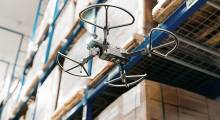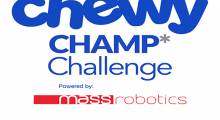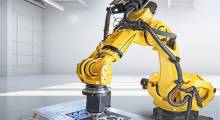The Georgia Tech College of Computing’s Robotics and Intelligent Machines (RIM) Center will use a gift of nearly $1 million of robotics equipment from Coca-Cola Bottling Co. Consolidated (CCBCC) to create a Manufacturing Robotics Logistics Laboratory on the Georgia Tech campus. The new laboratory will allow RIM faculty and students—who come from across Georgia Tech, including the Georgia Tech Research Institute—to study the use of robotics in supply chain and fleet management.
“Automation has made possible a vast number of efficiencies in modern commercial logistics and manufacturing,” said Henrik Christensen, RIM director and KUKA Professor of Robotics. “Using supply chains as an example, if we can use robots to optimize the entire process from start to finish, we can make improvements on a whole range of measures, such as end costs to consumers and environmental impact from transportation.”
The new 3,400-square-foot logistics lab initially will be outfitted with $944,000 in hardware from a CCBCC prototype bottling plant. Built by KUKA, a world leader in manufacturing robotics and system integration, the equipment includes robots, automatic guided vehicles (AGVs), conveyor technology, safety components and other system technology. KUKA has provided the resources and manpower for delivery and set-up of the robots.
Also providing resources to move the automation equipment to Georgia Tech and start-up the AGVs is Efacec USA, a leading supplier of automated materials handling and storage systems located in the greater Atlanta area.
“We are happy to partner with KUKA to bring Georgia Tech students the opportunity for hands-on learning with sophisticated robotics equipment,” said Lauren Steele, vice president of corporate affairs at CCBCC. “Using this technology, these students will be able to develop commercial applications in manufacturing that will strengthen our economy and create American jobs.”
Specifically Christensen said Georgia Tech will use the laboratory for three purposes: creating optimization algorithms for logistics; testing sensing equipment such as automated cameras and laser sensors; and for supporting the annual Virtual Manufacturing and Automation Challenge, organized in conjunction with the National Institute for Standards and Technology.
In addition to the specific uses Christensen envisions, he said the new lab will open up new possibilities for robotics students and faculty.
“As Georgia Tech continues to advance its robotics research in industrial systems, this major donation will give our students unparalleled access to a professional, industry-quality facility,” Christensen said. “No other university has a similar facility.”
”KUKA is very excited about the opportunity to collaborate with Georgia Tech in the field of manufacturing and logistics,” said Christian Wurll, Technical Director for Logistics of KUKA Systems North America. “The lab will be used to intensify the research and development in mixed case palletizing, mobile robotics and new manufacturing processes. In addition KUKA is glad to setup and support a state of the art lab environment which will inspire the young generation and will get them in touch with real world applications and equipment.”
“While Efacec has already been involved with Georgia Tech for the past few years in helping to develop engineering curriculum for the power transmission industry, we are pleased to continue our relationship in being a part of the creation of this new Manufacturing Robotics Logistics Laboratory,” said Jorge Guerra, Executive Director for Business & Operations of Efacec USA. “This new lab will give engineering students access to high-tech equipment with which they can increase their exposure to robotics and logistics.”
Manufacturing—along with health care and service robotics—is one of the three main robotics areas to which the United States should devote the bulk of its research focus and support in the future, according to a 2009 report by the Computing Research Association.
Article topics
Email Sign Up















